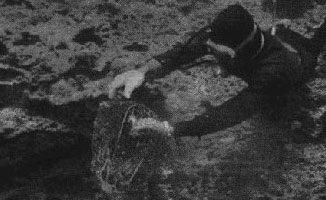|

In the above picture a marine biologist inspects coral reefs damaged by illegal fishing practices. In October, marine scientists
meeting in Bali warned that more than a quarter of the world's coral reefs had been destroyed by pollution, global warming
and poor fishing prctices, including the use of cyanide.
(Photo: AP - "The Caymanian Compass",
1 December
2000.
CYANIDE USED TO CATCH PET TROPICAL FISH IN INDONESIA
The following is an article that appeared in the "Environment" section of "The Caymanian Compass"
on 1 December 2000.
"Nusa Dua, Indonesia (AP) - Ever wondered why some of the tropical salt-water fish you bought at the pet shop died
so soon?
Chances are, a diver in Indonesea or the Philipines caught them by first squirting cycanide into the water, which stuns
the fish and allows them to be easily scooped into a net.
After a few days, a fish usually appears to recover. It is then exported to the United States, Europe and elsewhere to
be sold in pet stores for anything up to US$400.
After a month or two, though, traces of cyanide in the fish's system often attack its liver, eat away at its digetive
tract and corrode its respiratory system, until it dies.
But not only does cyanide irreversibly poison the fish it's used on, the toxin also damages the ocean environment, killing
other marine life.
So widespred is the problem that 1,000 environmentalists, marine biologists and pet-fish collectors have set up a worldwide
organisation - the Marine Aquarium Council - to try to eradicate the illegal practice.
Up to 20 million tropical salt-water fish are sold in the United States every year, said Paul Holthus, head of the Honolulu-based
group. Not all are poisoned, but many are, he said.
'Fish buyers are unknowingly contributing to the destruction of coral reefs and marine ecosystems,' he said.
Marine scientists meeting on Indonesia's tourist island of Bali warned recently that more than a quarter of the world's
coral reefs had been destroyed by pollution, global warming and poor fishing practices, including the use of cyanide.
They said that unless urgent measures are taken, the remaining coral reefs may be dead within 20 years.
Mark Erdman, a San Franscisco marine biologist who has long worked in Indonesia, said almost all aquarium-bound fish caught
in Indonesia are poisoned.
Fishermen often store the cyanide in cans on the ocean floor to escape detection by authorities. They then dissolve a
cyanide tablet in water in a plastic bottle. The deadly mixture is then squirted at schools of fish living around coral outcrops.
Holthus said cyanide is also used widely in the Philippines.
Aquarium fish from the two cuntries account for much of the tropical salt-water fish imported by the United States and
Europe, he said.
The international aquarium fish trade is worth about
$1 billion a year, experts said.
Comatose
In two warehouses on Bali, hundreds of brightly coloured fish float in small dirty tanks, waiting to be packaged in water-filled
plastic bags and flown out of the country. Clown tiger fish, with bright yellow lips, sharp teeth and pink dorsal fins, lie
on their sides seemingly comatose from cyanide.
Holthus said the use of poison is limited to only some tropical salt water varieties. More popular fresh water fish mostly
come from commercial fish ponds and are chemical-free.
He said that by reforming the salt water segment of the industry, the welfare of marine life could be improved and healthier
fish would be provided for collectors.
Walt Smith, a businessman from Los Angeles who exports live fish from Fiji, said the problem is not as widespread as some
fear. He said all the fish he sends to the United Sates are caught without poison.
The marine council plans to start monitoring fish exported from various parts of the world to ensure tht they have not
been caught by divers using cyanide and that they are handled professionally. Fish buyers in the United States and Europe
will be able to look for Marine Aquarium Council-certified fish in certain pet shops by the end of next year.
"We will test everything from the reef to the retailer," Holthus said.
Mike King, a pet-fish retiler from Grand Rapids, Michigan, said everyone will be a winner if environmentally sound fish-collection
prctices are observed.
"Most consumers want to do the right thing for the environment and the fish," he said. "They are prepared
to pay a little more for it."'
|
 |
|

